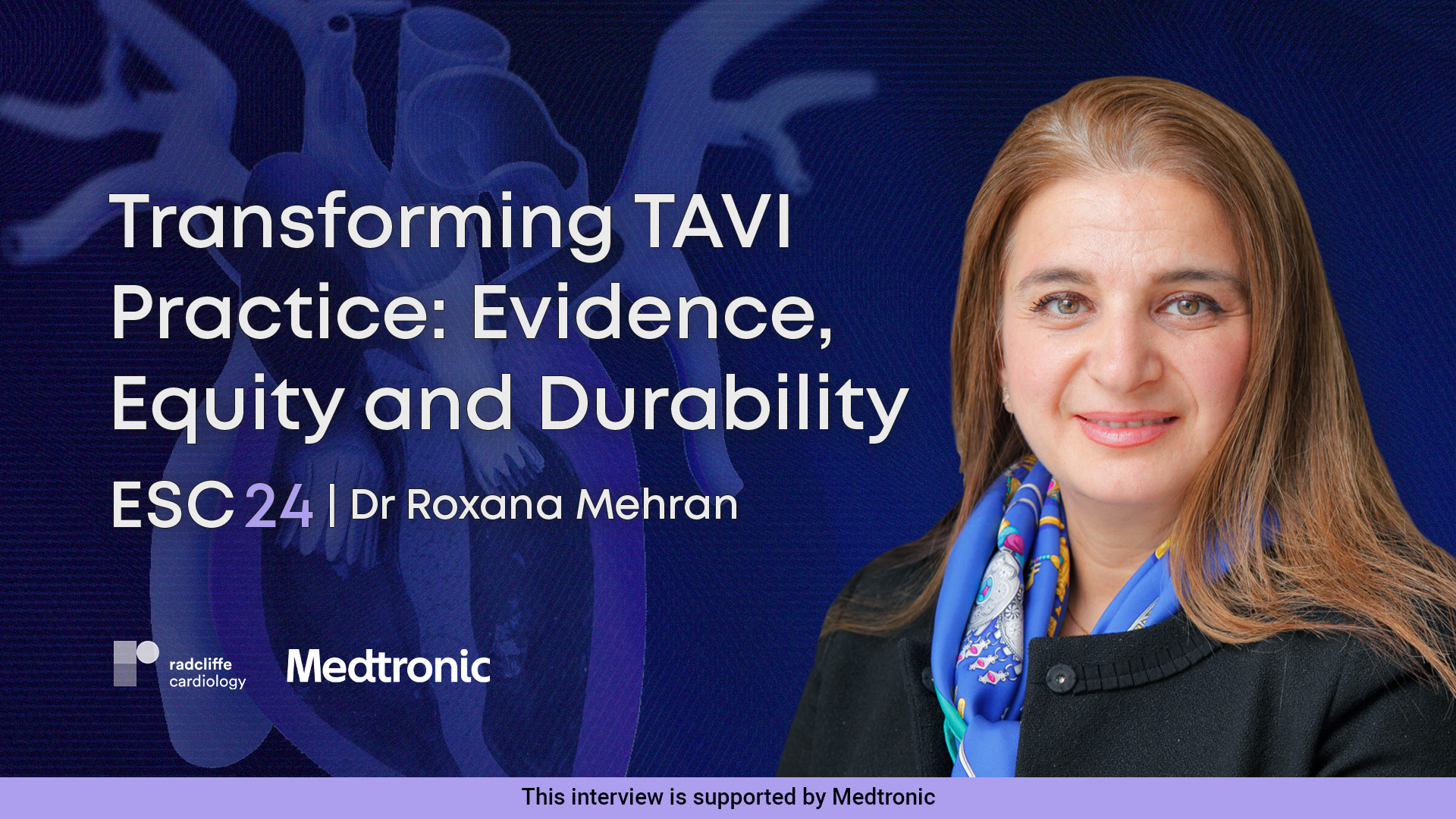Transforming TAVI Practice: Evidence, Equity and Durability
Published: 17 September 2024
-
Views:
 6454
6454
-
Likes:
 7
7
-
Views:
 6454
6454
-
Likes:
 7
7
-
 1m 41sPart 6 Take Home Message
1m 41sPart 6 Take Home Message
-
 4m 53sPart 1 Prof Roxana Mehran Interview Roxana Mehran, Vijay Kunadian, Didier Tchétché, Julia Grapsa, Joanna J Wykrzykowska
4m 53sPart 1 Prof Roxana Mehran Interview Roxana Mehran, Vijay Kunadian, Didier Tchétché, Julia Grapsa, Joanna J Wykrzykowska
-
 2m 2sPart 2 Welcome and Introduction Roxana Mehran, Vijay Kunadian
2m 2sPart 2 Welcome and Introduction Roxana Mehran, Vijay Kunadian
Overview
This video series includes a symposium first presented at ESC 2024 held in London, where Prof Roxana Mehran, Prof Vijay Kunadian, Dr Didier Tchetche, Dr Julia Grapsa and Dr Joanna J Wykrzykowska discuss transforming TAVI practice. The discussion covers topics such as the SMART trial, a comparison of the most commonly used TAVI valves and strategies to address disparities in diagnosing aortic stenosis in women.
Please click here to provide feedback on the ESC symposium.

Learning Objectives
- Gain insights on the landmark SMART trial, comparing the most used TAVI valves and discuss clinical implications
- Discover how to address disparities in aortic stenosis diagnosis and treatment of women
- Interpret the latest data on TAVI valve durability and predictors of valve longevity
Target Audience
- General Cardiologists
- Interventional Cardiologists
More from this programme
Part 1
Prof Roxana Mehran Interview
Prof Mehran summarises the key learnings from the scientific session.
| 1 session | |
| Prof Roxana Mehran Interview | Watch now |
Part 2
Welcome and Introduction
Welcome and introduction of the presenters and learning objectives by Prof Mehran and Prof Kunadian.
| 1 session | |
| Welcome and Introduction | Watch now |
Part 3
SMART Trial Results
Dr Tchétché presents the results of the SMall Annuli Randomized To Evolut or SAPIEN Trial (SMART Trial). The largest, most rigorous trial to date to randomise patients to the two most widely used TAVI devices and the largest TAVI trial to enrol mostly women. It includes a panel discussion on low-flow low gradient aortic stenosis patients and differences in Balloon-Expandable versus Self-Expandable Valves.
Part 4
Addressing Underdiagnosis in Women With Aortic Stenosis
Dr Grapsa presents the challenge of treating women with aortic stenosis, a common clinical scenario and the differences in clinical presentation between women and men. The session includes how to address underdiagnosis in women including sex specific imaging considerations. The panel discuss early diagnosis, referral of women with aortic stenosis and strategies to adopt to fine tune treatment to a female patient.
Part 5
Durability in TAVI Valves
Dr Wykrzykowska presents durability in TAVI valves, Bioprothetic Valve Dysfunction causes and types. She presents data and long-term follow-up from the Evolut™ TAVI low risk trial, PARTNER 3 trial and NOTION trial and also shares the SMART trial results and predictors. Re-intervention and real world insights from case studies are discussed alongside the panel discussion on valve durability, the need for re-intervention putting into prospective life expectancy and durability of the valve.
Part 6
Take Home Message
Prof Kunadian summarises the scientific session and shares the take home messages.
| 1 session | |
| Take Home Message | Watch now |
Faculty Biographies

Didier Tchétché
Didier Tchétché, (Clinique Pasteur, Toulouse, France) Graduated from the University of Paris V where Dr Tchétché obtained his post-graduate diploma of cardiovascular pathology in 2004. From 2004 to 2005, he completed a 12-month fellowship period in the Hemodynamic and Interventional Cardiology department of Clinique Pasteur in Toulouse and from 2005 to 2007 he was Head Assistant at the intensive care unit of Bichât Hospital in Paris.
In 2008, he joined the interventional cardiovascular group in Clinique Pasteur, Toulouse, and he is currently Head of the Structural programme with an experience of more than 5000 TAVI procedures. His main areas of interest are coronary interventions and valvular heart disease. He has been actively involved in many clinical trials involving new technologies and devices in the field of interventional cardiology.

Roxana Mehran
Professor of Medicine, Cardiology and Professor of Population Health Science and Policy
Roxana Mehran is Professor of Medicine, Cardiology and Professor of Population Health Science and Policy at the Icahn School of Medicine at Mount Sinai in New York. She is also Director of Interventional Cardiovascular Research and Clinical Trials at The Zena and Michael A Weiner Cardiovascular Institute at Mount Sinai Hospital where, over the past 5 years, she has led the development of a globally respected data and clinical coordination centre to support large, multicentre, multinational clinical trials designed to help improve outcomes and quality of life for patients undergoing interventional cardiovascular procedures. In recent years, her work has had a special emphasis on gaining a deeper understanding of anticoagulation and antiplatelet regimens post angioplasty and transcatheter valve replacement; and collection and interpretation of sex-specific data in cardiovascular clinical trials.
Roxana serves on editorial board of multiple peer reviewed journals, including …





